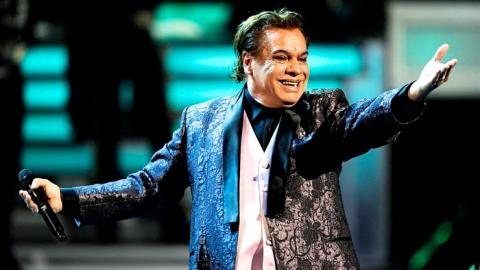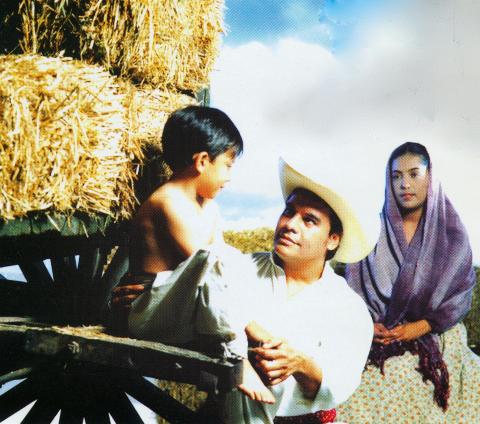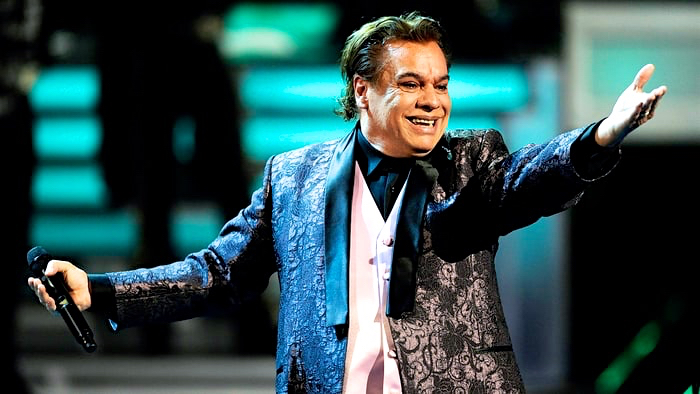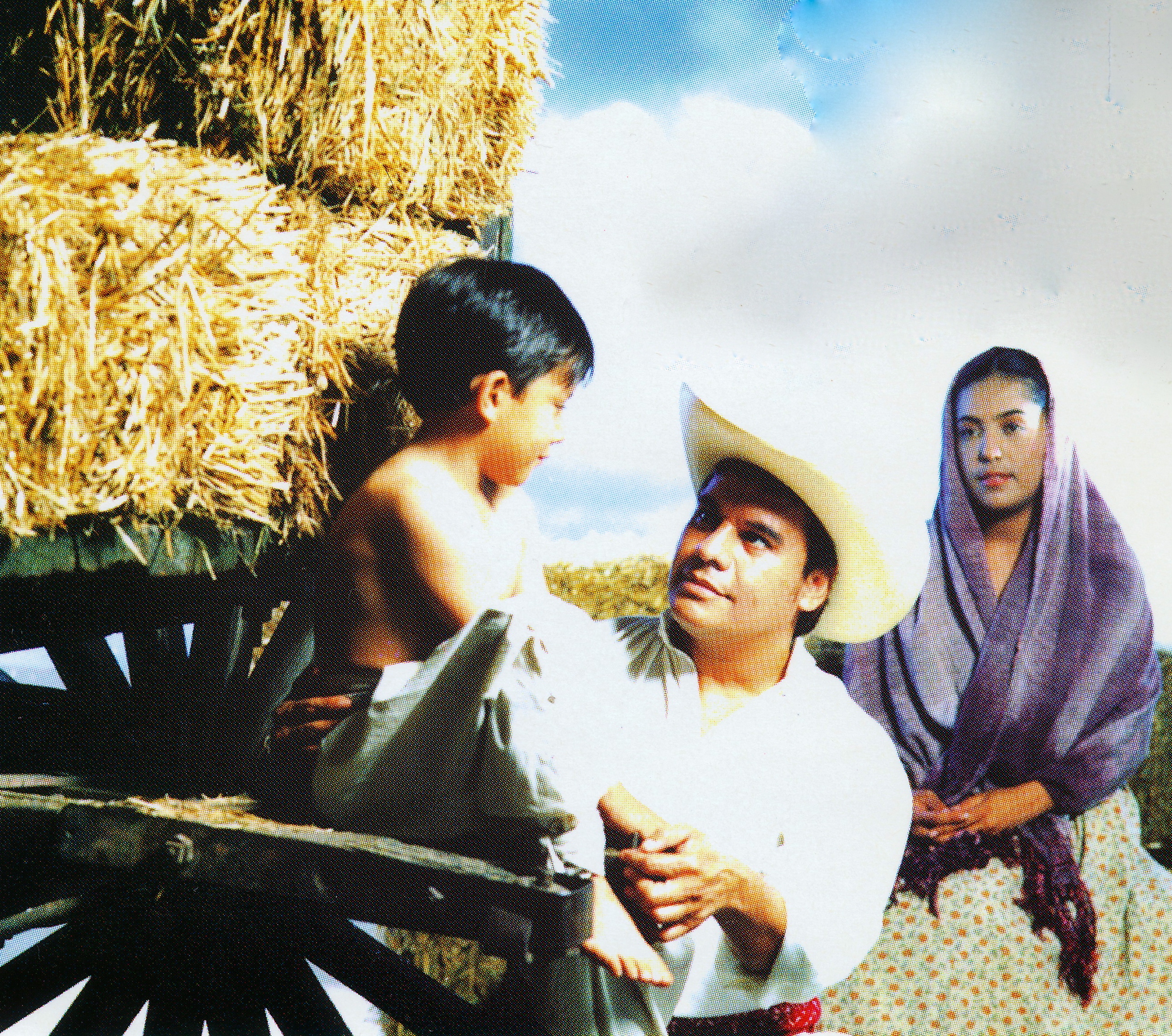Juan Gabriel: An Appreciation
 The death of Mexican singer and songwriter Juan Gabriel made headlines around the world this week. He was one of the most important and beloved pop music figures in Mexico from the last half of the 20th century. His career parallels that of a handful of superstar peers, including Vicente Fernandez and Los Tigres del Norte, who ascended in the 1970s and whose popularity continued into the new millennium.
The death of Mexican singer and songwriter Juan Gabriel made headlines around the world this week. He was one of the most important and beloved pop music figures in Mexico from the last half of the 20th century. His career parallels that of a handful of superstar peers, including Vicente Fernandez and Los Tigres del Norte, who ascended in the 1970s and whose popularity continued into the new millennium.
I’ve interviewed and reviewed Gabriel a few times over the years, in both good times and bad. The last time was in 2004 at L.A.’s Staples Center, in a sort of comeback show following a debilitating court battle with his former agents, which he lost. The settlement required him to pay the agency almost $2 million by splitting revenue from 45 concerts over two years, a sort of indentured tour.
On stage, he didn’t let the troubles get him down.
“For 2-1/2 hours Saturday, he hammed it up while belting out a marathon set of 29 of his songs, almost one for every year he’s been in show business,” I wrote in the Los Angeles Times. “The delighted, near-capacity crowd sang along with almost every word, their eager, admiring faces often projected on two overhead video screens.”
Fans still adored the Divo of Juárez. And that love would continue another 12 years, right up to the eve of his death during his final concert August 26, also in Los Angeles. Newspapers were filled with flash analysis of his career and his significance. And some aspects of his life do take some thought—such as his ability to overcome strong strains of homophobia and win universal admiration while flaunting an obviously gay, occasionally flamboyant persona on stage. In interviews, he usually sidestepped questions about his homosexuality, but everybody knew. As they say in Mexico, it was “un secreto a voces.”
 When I interviewed Juan Gabriel for the Los Angeles Times in 1984, he confronted the gay question as a painful affront, denouncing those who accused him of it, but never actually denying it. He said the talk of his sexuality contributed to his mother’s death. Then, near tears, the singer added he wished he too would die soon.
When I interviewed Juan Gabriel for the Los Angeles Times in 1984, he confronted the gay question as a painful affront, denouncing those who accused him of it, but never actually denying it. He said the talk of his sexuality contributed to his mother’s death. Then, near tears, the singer added he wished he too would die soon.
“Yes, because I clash with too many things in this world – with governments, laws, borders, discriminations, lies, betrayals, falsehoods,” JuanGa told me. “And aside from that, this loneliness. If I had my mother, I wouldn’t be suffering like this because I would have somebody who could understand me, who could guide me.”
By then, people knew his sad backstory. The poor boy from Michoacán who lost his father, first to an asylum then to suicide, who was placed by his mother in an orphanage in Juárez, who later escaped and fended for himself as one of Mexico’s many street kids. People loved the idea that he could triumph against such hardship.
And in his songs, all he conveyed was love and yearning, a childish innocence, plus equal parts joy and jealousy. He had a flair for what Mexicans call despecho, that cathartic feeling of getting the pain off your chest by rebuking, with a wicked wit, the one who leaves you. When he performed those songs on stage, his haughty gestures and suggestive mannerisms always brought hoots and hollers from fans, who could identify with the need to get even and recover some dignity after a humiliating betrayal.
That’s the point. When Mexicans cheered Juan Gabriel, they were rooting for themselves, both as individuals and as a people with shared sentiments. Outsiders sometimes didn’t get his schmaltzy melodrama, his kitschy stick. But those are English words that don’t translate. Mexicans and other Latinos simply didn’t judge him through that elitist lens. They just embraced him as one of their own.
Critics sometimes knocked the simplicity of his lyrics, but fans forgave him because the simple language went straight to the heart, riding on his resonant melodies. When he sang them, you couldn’t help but see the little boy inside, hurting but still having fun. His happy songs always stuck in our minds like ear candy, but you could always find a deeper meaning. There was a sense of nostalgia for a bygone place and time in “Noa Noa,” a song about the club in Juárez where he performed starting out. And in another early pop song, “No Tengo Dinero,” he peppily proclaims the notion that what a man carries in his heart is worth more than what he has in his wallet.
As I said in my review, “Like all great pop music, Gabriel’s lighthearted tunes serve as melodic markers by which people remember their own lives and loves.”
Despite Juan Gabriel’s prodigious output, the Frontera Collection contains just 28 tracks by the singer, all singles and mostly on Arcano, the New York-based label that once had the license to distribute Latin music released by RCA in various countries, including Mexico. (Arcano was part of the Caytronics Corporation, owned by Joe Cayre, which at one time had a virtual monopoly on major Latin releases in the US, with rights to all CBS and Ariola product from Spain and Latin America as well.) The collection has many more Juan Gabriel songs interpreted by other artists.
Discounting duplicates, the 28 Arcano sides represent 26 separate songs written and sung by Gabriel. Because these are early in his career, the singer’s voice seems thinner, less robust than in this prime. One other detail jumped out at me while reviewing these recordings: the frequent musical contributions by Jesús Rodríguez de Híjar, a respected mariachi arranger and musical director. Gabriel is often accompanied by Rodríguez’s Mariachi de America or by the famous mariachi Vargas de Tecalitlán.
Here are five of my favorites:
Ases y Tercia de Reyes (RCA SP-4216 and Arcano DKA0-9289)
I’m not a gambling man, but this reference to Aces and Kings in the title means that, in this soured relationship, Gabriel holds all the cards. The rousing mariachi accompaniment by Mariachi Vargas adds bravado to the once jilted lover who now holds the upper hand. Both singles are dated 1975, but the Arcano record sounds much cleaner than the RCA release.
Juro Que Nunca Volveré (Arcano DKA0-9481)
This is one of these tear-jerkers delivered with Gabriel’s passionate but imperfect voice, with hoarse, tequila-soaked sadness. Here he vows that he’ll never return, even if his fickle lover now begs him to come back. The more refined version by Spain’s classy Rocío Durcal, Gabriel’s favorite interpreter of his songs, was perhaps more popular. But it’s still a JuanGa classic. This recording is from 1978, with backing from El Mariachi de America de Jesús Rodríguez de Híjar, who also does the arrangement.
No Tengo Dinero (Arcano DKA1-9009)
This Arcano single has no date, but the famous song was the first single from Gabriel’s debut 1971 album, El Alma Joven (Young Soul), and it was his first hit. It’s a typical pop ditty with a highly sing-along chorus that stays with you all day and keeps a smile on your face. Even my 13-year-old son, who’s just learning Spanish, couldn’t stop singing after hearing it for the first time this week in the wake of the singer’s death. The accompaniment and arrangement are by Chucho Ferrer, one of Mexico’s most prominent musicians and orchestra leaders.
Se Me Olvidó Otra Vez (Arcano DKA0-9289 and RCA SP-4216)
The opening strains of the sole guitar set the mournful mood of this song of longing and heartbreak, which Mexicans say “para cortarse las venas” (to cut your veins in despair). The lyric has that tricky twist, and punch line, that became a Gabriel trademark. The title refers to something he forgot again, in connection to the love who left him. Then he tells her, as if in a letter, that he’s waiting for her “in the same place and with the same people” in hopes she’ll come back and find nothing has changed and they can be together and never part again. But then he adds that maybe he’s made a mistake. Because there’s that thing he forgot—that she never loved him to begin with. This is where hope meets despair, and why Mexicans cry to his music. Both recordings are dated 1975, though again, the Arcano disc has much less surface noise but also less fidelity. Backing is by Mariachi Vargas and arrangement by Jesús Rodríguez de Híjar.
Tarde (Pronto PR-6165)
This track is sung by Rocío Durcal, in her softer, more delicate and sophisticated style. But the feeling is still all there, with the slightest twinge of flamenco in her voice. This is a great example of Gabriel’s simple writing style, direct and declarative, with some deliberate word repetition. There’s a lot of hurt and loss here, and it’s expressed with that open-heart quality that sparks immediate sympathy, as when one sees a hurt child. The backing and arrangements again are by Jesús Rodríguez de Híjar, but here they are more orchestral, less folksy, to match the Spanish singer’s elegance. Note, in this regard, the use of a muted trumpet. It’s on the Pronto label, which Caytronics used to release Ariola Latin product domestically. The single is dated 1977 and it’s from the album Rocío Durcal Canta a Juan Gabriel, which established her as the composer’s top interpreter.
- Agustín Gurza
Tags
Images


